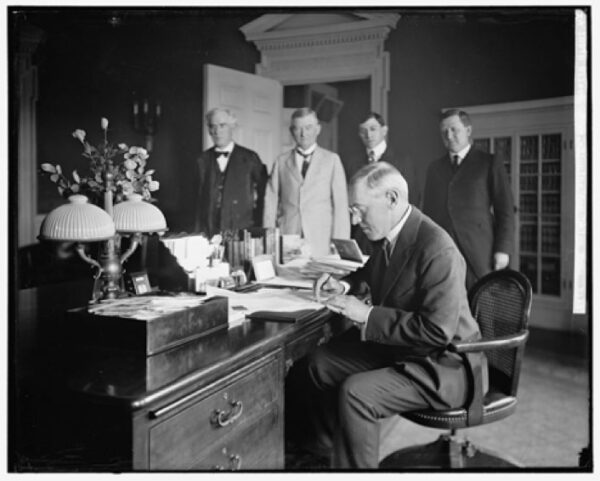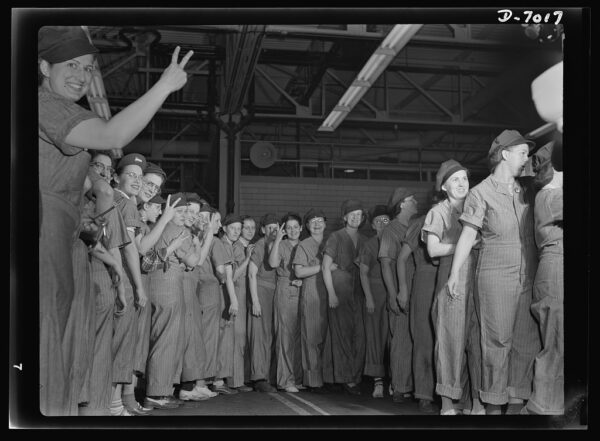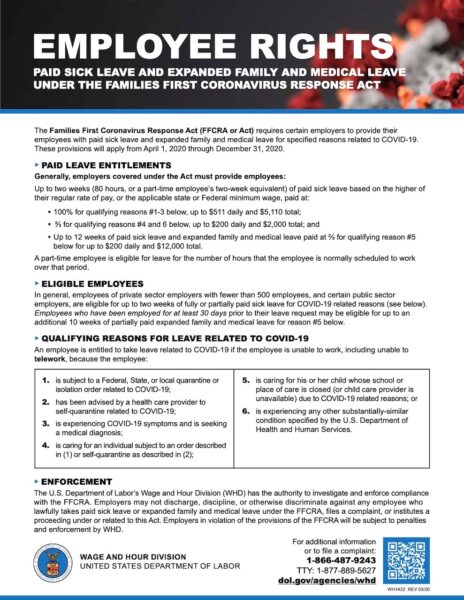Posts Tagged ‘california employment laws’

COVID-19, I PRESUME
Workers Compensation Coverage for Diagnosed Workers California employers must carry workers’ compensation insurance for on-the-job injuries and job-related illnesses. California governor Newsom’s May 6, 2020 Executive Order N-62-20 (the order) directs that workers contracting COVID-19-related illness between March 19 and July 5, 2020 are presumed entitled to full work comp coverage, including medical care, temporary […]

THE NEW NORMAL
Once upon a time (not too) long ago, our current of state business and workplace hibernation was unimaginable. As management plans for return to full operation, best practice in whatever the form – letter, notice posting, policy – will acknowledge a new definition of normal, welcoming “respiratory etiquette,” “hand hygiene,” “personal protective equipment” (PPE), and “effective social distancing” into daily interchange.

ARE WE DONE YET?
Workplace Return Planning There is no shortage of federal guidelines for preventing a new pandemic wave as more businesses welcome workers back to resume full production. Reflecting many of our recent articles, the Occupational Safety and Health Administration (OSHA) Guidance Summary: Preparing Workplaces for COVID-19 advises: Developing a preparedness and response plan (also see our article: Thinking the […]

OY VEY, NOW WHAT?
Employers Must Use New I-9 Form Starting May 1, 2020 All U.S. employers must verify identity and work authorization for each employee hired within the U.S., including citizens and non-citizens, using “Form I-9, Employment Eligibility Verification” (I-9 Form). Starting May 1, 2020, businesses nationwide must begin using the revised I-9 Form (rev. 10/21/2019). Section 2 […]

OUR NEW NORMAL WEEK FIVE
“Safer at Home” Updated, Statewide Coronavirus Response We are in our fifth week following Governor Newson’s March 18 order requiring all California residents until further notice to stay at home or place of residence except for those in businesses and functions deemed essential to 16 federally-designated “critical infrastructure” sectors. The state last updated yesterday its […]

KEEP IT TO YOURSELF
Essential Workers Must Cover Up and Stay Six Feet Apart Facing COVID-19’s unfolding (sur)realities, LA City, LA County, Pasadena and Riverside County, among other local California public health authorities, have ordered that wear-a-mask and six-foot distance “recommendations” are now mandatory whenever possible for workers at essential businesses. Effective April 10, a City of Los Angeles […]

COVID-19 SAFETY NETS
Overview of CARES Act Small Business Loans On March 27, 2020, President Trump approved The Coronavirus Aid, Relief, and Economic Security (CARES Act), a $2 trillion relief package intended to protect small business from the economic impacts of COVID-19. Some media have overstated CARES Act business loans as “free money” or “fully forgivable.” Enterprise owners […]

WHEN THE SHOW MUST GO ON
Key Protection Protocols for an Essential Industry Employee’s COVID-19 Diagnosis/Symptoms As of April 7, all but five states (the Dakotas, Nebraska, Iowa, and Arkansas) have some form of COVID-19 “safer at home” orders in place. For those businesses permitted or directed to stay open as part of the 16 federally-designated “critical infrastructure” sectors, management faces […]

“SAFER AT HOME”
California’s Coronavirus Response Statewide and Local April 3, 2020 Current Status Welcome to our new pandemic-driven world, evolving daily. On March 19, 2020, California Governor Gavin Newson issued Executive Order N-33-20 requiring all California residents until further notice to stay at home or place of residence except for those in businesses and functions deemed essential to […]

COVID-19 GETS NOTICED
As reported in “Federal Coronavirus Workplace Relief,” the March 18 Families First Coronavirus Response Act (FFCRA) contains two nationwide employee leave laws, the Emergency Paid Sick Leave Act (PSL Act) and the Emergency Family and Medical Leave Expansion Act (EFMLA). In essence and applicable to businesses with fewer than 500 employees: The PSL Act requires […]
